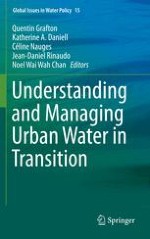2015 | OriginalPaper | Buchkapitel
16. Does Residential Water Use Depend on Water Quality? Some Answers from a French Case Study
verfasst von : Arnaud Reynaud, Marian A. Garcia-Valiñas
Erschienen in: Understanding and Managing Urban Water in Transition
Verlag: Springer Netherlands
Aktivieren Sie unsere intelligente Suche, um passende Fachinhalte oder Patente zu finden.
Wählen Sie Textabschnitte aus um mit Künstlicher Intelligenz passenden Patente zu finden. powered by
Markieren Sie Textabschnitte, um KI-gestützt weitere passende Inhalte zu finden. powered by
